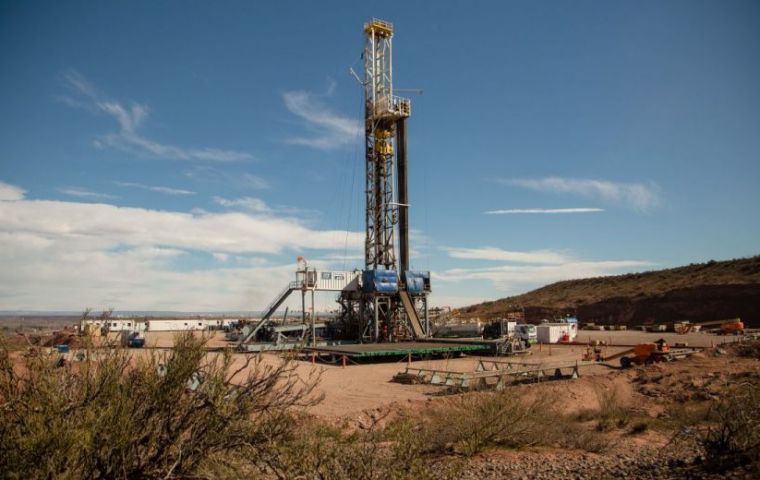MercoPress. South Atlantic News Agency
Argentina's shale deposits will take 12/18 months to recover pre Covid-19 activity
 Shale-rich Neuquen saw an increase in oil production in July. Crude output rose by 10%, on the year, to 155,400 b/d, according to the provincial government
Shale-rich Neuquen saw an increase in oil production in July. Crude output rose by 10%, on the year, to 155,400 b/d, according to the provincial government Argentina's Vaca Muerta shale patch will take 12-18 months to resume pre-Covid-19 activity because of lagging demand, according to Alejandro Monteiro, energy minister of Neuquen province.
“We believe it will take a while for fuel demand to fully recover,” Monteiro said in an industry webinar on Monday.
Many wells have been drilled but not connected, but even when demand fully recovers it will take even longer for drilling activity to return to pre-pandemic levels because of storage constraints, he said.
State-controlled YPF, Argentina's top producer, has said it has 71 shale oil wells and 10 shale gas wells in Neuquen that have been drilled but not completed.
In mid-2019, companies had said they would invest a total of more than US$ 6bn in upstream projects in Neuquen in 2020. Now the number is closer to US$ 3bn, the lowest since 2016, according to provincial data.
Companies put the brakes on investment following a fuel and crude price freeze implemented in August 2019 by the administration of then-president Mauricio Macri shortly before he lost reelection to Alberto Fernandez.
The price freeze, coupled with policy uncertainty under the new government and weaker market conditions this year, eroded Argentina's climate for upstream investment.
Shale-rich Neuquen nonetheless saw an increase in oil production in July. Crude output rose by 10%, on the year, to 155,400 b/d, according to the provincial government. Of that total, 77%, or 119,500 b/d, was unconventional and 60,419 b/d was exported.
Gas production in the province dropped 12% to 70.67mn m3/d. Shale output made up 45% of the total with 31.53mn m3/d and tight production made up 24%, or 17mn m3/d.
But Vaca Muerta registered just 44 fractures in July, compared with 398 a year earlier, according to data provided by Luciano Fucello, country manager of NCS Multistage, a US-based services firm. All of the fractures last month were carried out by Halliburton for operator Chevron.
In January-July, there have been a total of 1,459 hydraulic fractures in Neuquen, an average of 208 per month, compared with 553/month in 2019.
Monteiro said he is optimistic that a new gas subsidy plan to be unveiled by the government soon could help resuscitate shale activity and avoid a sharp increase in gas imports next year in winter.
But he urged policy changes, including tax incentives and a cut in crude export taxes at a time when more companies are exporting light sweet Medanito crude from Neuquen because of gutted domestic demand. Under current regulation, once benchmark Brent passes $45/bl, crude export duties increase on a sliding scale to a maximum of 8% at US$ 60/bl.




Top Comments
Disclaimer & comment rulesCommenting for this story is now closed.
If you have a Facebook account, become a fan and comment on our Facebook Page!